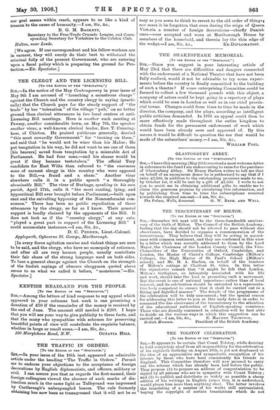THE CLERGY AND THE LICENSING BILL.
pro THE EDITOR OF THE "SPEOTATOR.1 SrE,—In the notice of the May Contemporary in your issue of May 9th I am accused of "launching a monstrous charge" against the Church and the country clergy in saying (practi- cally) that the Church pays for the steady support of "the trade" by her " toleration " of the village "pub," on no better ground than clerical utterances in two local centres at anti- Licensing Bill meetings. Here is another such meeting at Pewsey, another considerable town, on May 7th, the speaker another vicar, a well-known clerical leader, Rev. T. Cunning- ham, of Chirton. He praised publicans generally, decried "this most cowardly Government" for "turning on them," and said that "he would not be wiser than his Maker; He put temptation in his way, he did not want to see one of them [his hearers] saved from temptation by a miserable Act of Parliament. He had four sons,—and his shame would be great if they became teetotalers." The official Tory candidate for East Wilts then referred to "the enormous mass of earnest clergy in this country who were opposed to the Bill,—a fraud and a sham." Another vicar elsewhere calls it in a public speech "a thoroughly abominable Bill." The vicar of Burbage, speaking in his own parish, April 27th, calls it "the most canting, lying, and hypocritical Bill ever brought before Parliament,—built upon cant and the snivelling hypocrisy of the Nonconformist con- science." There has been no public repudiation of these utterances by the clergy, so far as I know. Their general support is loudly claimed by the opponents of the Bill. It does not look as if the "country clergy," at any rate, "played a great part in support of the Licensing Bill." I could accumulate instances.—I am, Sir, &c., D. C. PEDDEB, Lieut.-Colonel. Applegarth, Ogbourne St. George, Marlborough.
[In every fierce agitation unwise and violent things are sure to be said, and the clergy, who have no monopoly of reticence, and after all are very human people, usually contribute their fair share of the strong language used on both sides. To base a general charge against the Church on the strength of the foolish sayings of obscure clergymen quoted above seems to us what we called it before, "monstrous."—E. Spectator.]






































 Previous page
Previous page